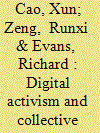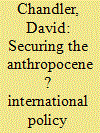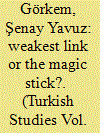| Srl | Item |
| 1 |
ID:
186848


|
|
|
|
|
| Summary/Abstract |
This study examines the discursive practice of mourning and commenting by netizens on the final social media post made by Dr Li Wenliang, regarding it as a form of political participation and competitive discursive politics enacted in cyberspace. Discourse theory is applied to conduct discourse analysis on 4000 comments. We identified two strategies that netizens used to establish an alternative space for discourse. The first involved hidden protests expressed through multi-semantic mourning, avoiding suppression by indirectly challenging official authorities. Second, through engagement with microblogs, netizens applied personalized narratives to form a collective memory and a counter-memory space that departed from the official normative narrative. Discursive activities enacted by netizens stimulated the political agenda of resilient adjustment on the part of the authorities, leading the government to accept and incorporate public demands into policies through strategic rectification. These findings help to better understand the significant power of disorganized connective action that is reliant on affective citizens and the further development of regime resilience on the part of the Chinese political system in response to digital activities.
|
|
|
|
|
|
|
|
|
|
|
|
|
|
|
|
| 2 |
ID:
152405


|
|
|
|
|
| Summary/Abstract |
This article analyses security discourses that are beginning to self-consciously take on board the shift towards the Anthropocene. It first sets out the developing episteme of the Anthropocene, highlighting the limits of instrumentalist cause-and-effect approaches to security, which are increasingly becoming displaced by discursive framings of securing as a process generated through new forms of mediation and agency and capable of grasping interrelations in a fluid context. This approach is the methodology of hacking: creatively composing and repurposing already existing forms of agency. It elaborates on hacking as a set of experimental practices and imaginaries of securing the Anthropocene, using as a case study the field of digital policy activism with a focus on community empowerment through social-technical assemblages being developed and applied in ‘the City of the Anthropocene’: Jakarta, Indonesia. The article concludes that policy interventions today cannot readily be grasped in modernist frameworks of ‘problem solving’ but should be seen more in terms of evolving and adaptive ‘life hacks’.
|
|
|
|
|
|
|
|
|
|
|
|
|
|
|
|
| 3 |
ID:
151666


|
|
|
|
|
| Summary/Abstract |
This article summarizes the first part of the findings of a larger study which gathers data on Turkish activists’ perceptions on the scope, strength and limitations of digital activism. Specifically, the study explores what strength Turkish activists attribute to digital activism in achieving certain objectives, whether Turkish activists are optimistic, pessimistic or persistent in their attributions related to digital activism, and whether they believe in the possibility of an e-revolution. Both quantitative and qualitative data were collected via a web-based survey of 302 activists. The survey employed a Likert Scale to measure the efficacy that Turkish activists attribute to digital activism in achieving different objectives as well as six open-ended questions that provide in-depth qualitative data.
|
|
|
|
|
|
|
|
|
|
|
|
|
|
|
|